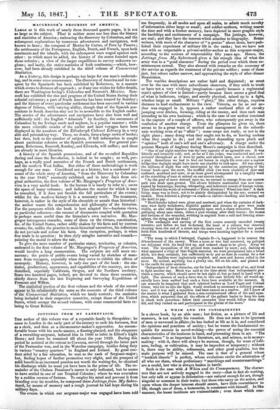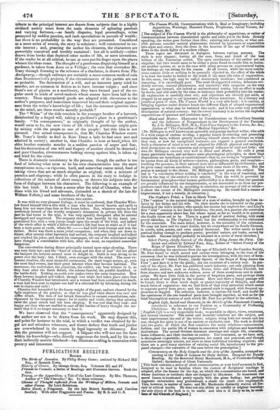A WHIM AND ITS CONSEQUENCES
IS a clever book, by an able man; but fiction, as a picture of life and manners, is not exactly his vocation. He does not seem to be ignorant of men or unversed in affairs ; he has looked at life as it is, and considered the opinions and practices of society; but he wants the fundamental re- qmsite for success in novel-writing—the power of seeing the essential characteristics of the business in hand, and presenting them in act. "The main chance" is as important in literature, art, and science, as in money- making: with it, there will always be success, though, for want of lofti- ness, feeling, or cultivation, it may be imperfect or temporary; without it, there may be ability, refinement, and other good qualities, but the main purpose will be missed. The case is that of a general whose "bookish theoric" is perfect, whose evolutions excite the admiration of all who see them, whose preliminary " marchings and countermarchings" are a model, but who is always beaten in battle. Such is the case with A Whim and its Consequences. The charac- ters that are not actively engaged in the story—that in fact do nothing, but only talk or appear in delineation—are natural enough for art,. though singular or common in their traits; but those who carry on the action, and upon whom the deeper interest should centre, have little resemblance. to life, though one of them, a humourist, is consistent with himself. . In like manner, the lesser incidents are vraisemblable ; even those which con- tribute to the principal interest are drawn from subjects that in a highly civilized society must form the main elements of agitating passions and varying fortunes,—as family disputes, legal proceedings, crime prompted by sudden passion, and rash speculations in pursuit of wealth : but there is no probability in the way they are presented. Considered as a mere series of events, the story is coherent; well constructed to ex- cite interest ; and, granting the author his elements, the characters are powerfully conceived and forcibly sustained : but all is unlikely—either drawn from books that depicted other modes of life, or mere inventions. If the reader be at all critical, he can at once put his finger upon the places whence the ideas come. The thought of a gentleman disguising himself as a gardener, is taken from Lave in a Village; the ruin that overtakes Mr. Tracy through listening to the schemes of a charlatan, is drawn from The Antiquary,—though railways are certainly a more common mode of ruin than Dousterswivers projects, if the circumstances of the parties are not so probable. The destruction of a will, and an innocent party tried for murder, are so common in fiction as to have become vulgar ; and since Scott's use of gipsies as a machinery, they have formed part of the re- gular stock in trade of novel-makers whose scenes have been laid in the country. These appropriated goods are adapted with cleverness to the author's purposes, and sometimes improved beyond their original appear- ance from the writer's knowledge of life ; but the constant question rises to the mind, are these results morally probable ?
The "Whim" of the title consists in the younger brother of a baronet, disinherited by a forged will, taking a gardener's place in a gentleman's family. "Its consequences," as originally thought of by the author, would seem to be, the new views of ilk which a gentleman might gain by mixing with the people as one of the people: but this idea is not pursued. One actual consequence is, that Mr. Chandos Winslow enters Mr. Tracy's family to find in Rose Tracy a lady he had once met and admired in society'; another is, that Chandos is near at handwhen his elder brother commits murder in a sudden passion of anger and fear, lest his destruction of one will and forgery of another should be detected ; and poor Chandos, circumstances looking strong against him, is taken up and tried for the crime.
There is dramatic consistency in the persons, though the author is too fond of infusing what seem to be his own characteristics into the more conspicuous roen,—a vigorous, hard, and somewhat coarse mind, fond of taking views that are as much singular as original, with a mixture of paradox and claptrap; while he often pauses in his story to indulge in reflections of the nature of short essays, or throws his subjects into the form of dialogue between his characters. The following is an example of this last kind. It is from a scene after the trial of Chandos, when he dines with his friend and advocate, (intended as a sketch of the late Sir William Follett,) and some brothers of the bar.
LAWYERS RELAX&G.
It was with no very pleasant feelings, it must be confessed, that Chandos Wins- low found himself tete-a-tete with a man who had moved heaven and earth to hang him not more than four or five hours before. But, whatever notion be had previously formed of the worthy sergeant's demeanour in private life from the part he had borne in the trial, it was very speedily dissipated after he entered =wigged and nngowned. The sergeant shook him heartily by the hand, con- gratulated him with a very joyous laugh upon the result of the trial, and talked of the whole affair in which a fellow-creature's life had been at stake as if it had been a mere game at cards, where Sir —had held most tramps and won the rubber. Never was there a more jovial companion; and when they sat down to dinner, after several other banisters had arrived, the sergeant laughed and talked and cracked his jokes, and drank his champagne till one of the uninitiated might have thought a consultation with him, after the meal, an expedient somewhat dangerous.
The conversation during dinner principally turned upon snipe-shooting. There was very little law; and the "feast of reason and the flow of soul" did not afford the banquet the lawyers seemed most to delight in. Habit is very strong in its power over the body; but, I think, even stronger with the mind. The most ve- hement rivalries, the most mournful ceremonies, the most tragic scenes, ay, even the most fatal events, lose their great interest when they become habitual. The statesman, the undertaker, the physician, the soldier, can bear witness to it, as they feast after the fierce debate, the solemn funeral, the painful deathbed, or the battle-field. Nothing on earth ever makes twice the same impression. How those lawyers laughed and talked, though two trials had taken place since that of Chandos Winslow had terminated; and a woman had been condemned to death, a man had been sent to expiate one half of a criminal life by labouring during the rest in chains and exile!
Chandos felt benumbed by the heavy weight of the past, and not cheered by the light emptiness of the present; so that he was glad when dinner was over and coffee drunk. The men of law betook themselves to earnest consultations, rein- vigorated by the temporary repose; for in reality and truth, during that seeming ravel the giant minds had but been sleeping. It was rest that they took: and happy are they who are enabled to cast off the burden of heavy thought the mo- ment that it is no longer necessary to bear it.
We have observed that the "consequences" apparently designed by the author are not to be drawn from his work. He may dispute this, and point for instance to the trial, in which a verdict was obtained by le- gal art and mistaken witnesses, and thence deduce that truth and justice are overwhelmed in the courts by legal ingenuity or chicanery. But this the premises will not support. A litigant who will not use the facts within his knowledge—who directly suppresses the truth, and by his con- duct indirectly asserts falsehood—can illustrate nothing in connexion with poverty and innocence.



























 Previous page
Previous page